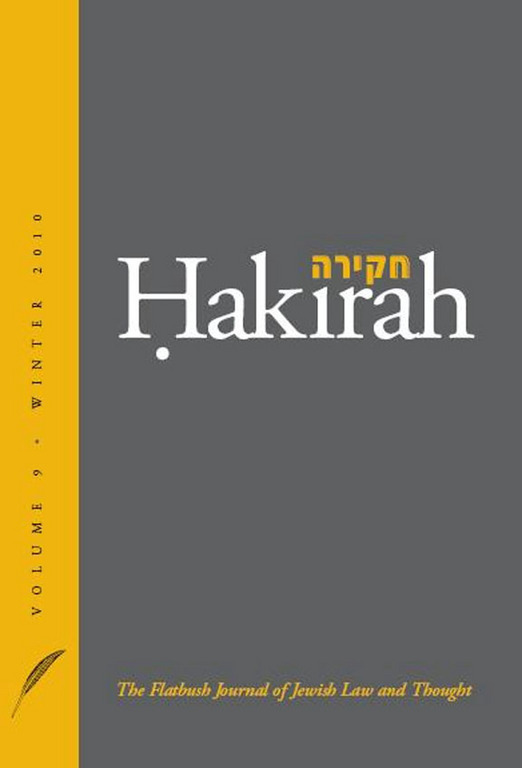The Kosher Bookworm: Hakirah, high quality essays on science and history
The Kosher Bookworm
By Alan Jay Gerber
Issue of February 12, 2010/ 28 Shvat 5770There is no shortage of topical Jewish articles on various subjects; high-quality articles are another story. The recently issued periodical, Hakirah: The Flatbush Journal of Jewish Law and Thought, Vol. 9, provides some of the highest quality Jewish scholarship available. The current issue deals with a multitude of issues by writers of unquestioned expertise. We’ll focus on two writers whose names may be familiar, Rabbi Dr. Edward Reichman and Mr. Joseph Bobker.Rabbi Dr. Reichman’s essay deals with the rather esoteric topic of “Anatomy and the Doctrine of the Seven-Chamber Uterus in Rabbinic Literature” - hardly the topic for daily conversation. However, Reichman’s study is based upon years of research and lecturing on this topic and seeks to focus Jewish Halachic thought and method upon historic, realistic and analytical grounds. This would give us a better perspective of the role of science and the history of science in forming Halachic responsa, and of the importance of modern medicine and science in formulating realistic criteria for modern day Halachic outcomes.
In my conversations with Dr. Reichman, he placed great emphasis and clarity upon what his aim was in writing this essay.
“Rabbinic Literature is replete with references to medical and scientific theories from previous centuries. In particular, in the areas of anatomy, we find a number of notions that confound the modern reader. Contrary to popular belief, these notions are not unique or exclusive to rabbinic literature, but are often based on contemporaneous medical or scientific doctrine. Appreciating the historical context of these statements better enables the reader to analyze these sources,” he explained.
“In this essay I try to focus on the history of a curious anatomical notion found in rabbinic literature. This notion, known as the doctrine of the seven-chamber uterus, spans eight centuries and many diverse areas of rabbinic literature. I review this literature and reveal a previously unknown Medieval manuscript reference to this doctrine. This exercise serves as an example of how an understanding of medical history can enhance our study of rabbinic literature.”
Dr. Reichman, a resident of Woodmere, is a graduate of Yeshiva University, where he was ordained. He is an associate professor of both Emergency Medicine and of the Philosophy and History of Medicine at the Albert Einstein College of Medicine. He is one of the world’s leading authorities on Jewish medical ethics.
This article, while seemingly complicated, is well written and easily comprehensible. There is a lot to be learned from it, and I strongly urge you to read it.
On a totally different note, we have an essay by Joseph Bobker dealing with the somber topic of the Holocaust. Titled, “To Flee or to Stay,” the author, a resident of Lawrence, touches upon one of the most sensitive subjects in Holocaust studies: the role of the European rabbinate in the pre-war years (1920-1939) in preventing European Jewry from emigrating to Eretz Yisrael and other countries. This heart-wrenching subject is given a dignified, dispassionate, and non-judgmental treatment by Bobker; something that is much to his credit. This topic is laden with emotion and it would be easy for anyone of simpler motivation to point accusatory fingers at any number of rabbinic leaders blaming them for the situation that was to ensue after the outbreak of war in 1939.
While there were questionable ideological predispositions held by many Jewish religious leaders in that era, including wrongheaded anti-Zionist attitudes that had no basis in reality and gross errors in poor judgment, Bobker takes a firm stand in defense of the honest motivations that were at the heart of these rabbis’ actions and beliefs. He goes into great detail in enumerating the hundreds of great rabbis who chose to stay with their followers rather than save themselves when the opportunity arose. The lists of names are awesome and a source of pride.
This article, 38 pages in length, is excerpted from a forthcoming book by Bobker titled, “The Rabbis and the Holocaust,” to be published by Gefen Publishers this coming summer. If this excerpt is any indication, this book is bound to be the font of much future discussion and controversy. The Kosher Bookworm intends to be there to cheer this on. Only an open discussion will help in ultimately bringing out the truth. Any attempt to prevent or censure discussion, or to issue nefarious bans and isurim will prove to be counter-productive.
The publishers of Hakirah are to be complimented for the quality of scholarship their journal has come to represent. In my opinion, to date, it is among the classiest periodicals on the Jewish journalistic scene.

 52.0°,
Light Rain Fog/Mist
52.0°,
Light Rain Fog/Mist 




